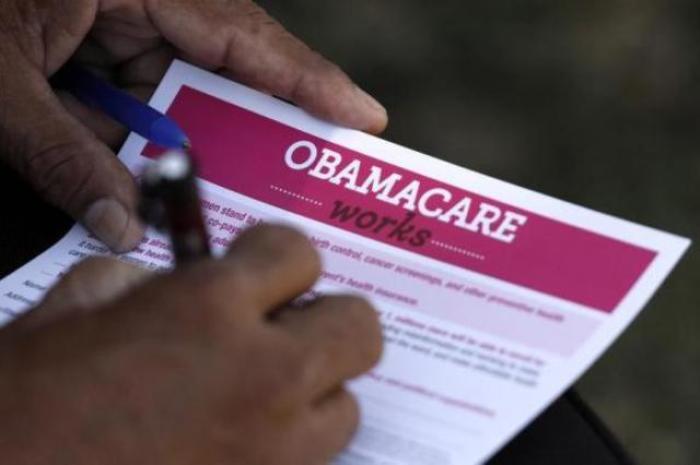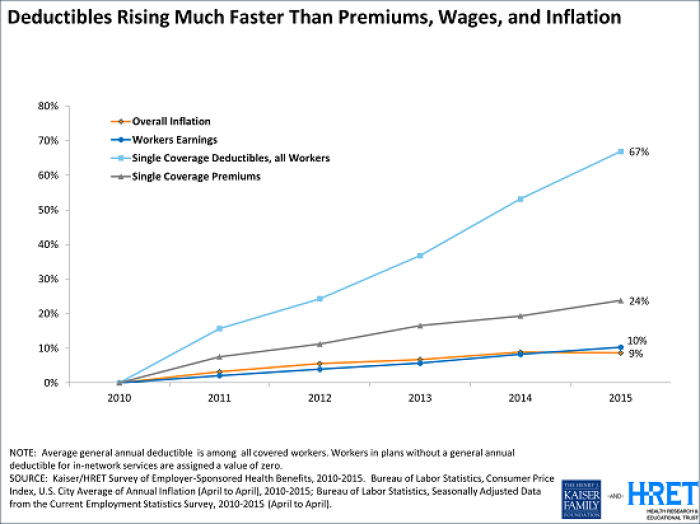Since Obamacare, Health Insurance Deductibles Spike 67%, Study Finds

In the last five years, the number of workers with health insurance deductibles, as well as the size of those deductibles, have increased at a much faster rate than increases in workers' wages and general inflation, according to a new study released by the Kaiser Family Foundation on Tuesday.
Since the Affordable Care Act or "Obamacare" was signed into law in 2010, according to the Kaiser Family Foundation/Health Research & Educational Trust 2015 Employer Health Benefits Survey, both the growing number of workers with deductibles and the size of those deductibles have resulted in an overall 67 percent increase in health insurance deductibles for workers.
Meanwhile, the increase in single premiums has also been high but less than the deductibles spike, at a 24 percent growth rate.
The rate of increase in health insurance deductibles is also nearly seven times the growth rate of workers' wages, which stand at 10 percent, and general inflation at about 9 percent.
"With deductibles rising so much faster than premiums and wages, it's no surprise that consumers have not felt the slowdown in health spending," said Foundation President and CEO Drew Altman in a release.
Maulik Joshi, president of HRET, an affiliate of the American Hospital Association, said, however, that "employees are benefiting from stable employer health benefits coverage and modest premium growth." He further noted that "many employers are tying financial incentives to employee participation in health and wellness programs."
Since 2005, according to the survey, health insurance premiums have grown an average of 5 percent each year, as compared to 11 percent annually between 1999 and 2005.
It was also noted that the average annual premium for single coverage is $6,251 and workers paid an average of $1,071 to that amount. The average family premium, on the other hand, stood at $17,545, and workers on average contributed $4,955.

Some 81 percent of covered workers are in health insurance plans with a general annual deductible, according to the survey, and that deductible average was $1,318 for single coverage this year.
Covered workers in smaller firms (three to 199 workers) face an average deductible of $1,836 this year, which is 66 percent more than the $1,105 average deductible covered workers at large firms (at least 200 workers) faced.
Some policy experts and employers are now worried, however, that the higher deductibles for health insurance could be pushing some people to skip medical care even if they have serious health conditions.
"It may be tamping down on unnecessary care, but we're seeing a lot of evidence of skimping on necessary care," Sara R. Collins, vice president for health care coverage and access at the Commonwealth Fund told The New York Times.
A recent Truven Health Analytics analysis of employers' insurance claims cited by the Times showed that companies saw fewer workers going to the doctor or getting lab tests when workers had a high-deductible plan. They also saw a decline in care for people with chronic conditions.
"There's a real risk people won't get the care they need," David Lansky, chief executive of the Pacific Business Group on Health, a west coast employer, told the Times. Many of the companies he works with, he says, are now hesitant to raise deductibles much higher because they believe "we've gone as far as we should go."
The survey, which also looked at how employers have been preparing for the Affordable Care Act's excise tax — or "Cadillac tax" as it is sometimes called — on high-cost health plans, which starts in 2018, found that a majority had already started preparations.
Some 53 percent of large employers (those with 200 or more workers) offering health benefits said they did assessments on whether or not health plans would exceed the Cadillac tax thresholds, and about 1 in 5, or 19 percent, said their plans with the largest enrollment would exceed the threshold amount.
Another 13 percent of large firms offering health benefits said they made changes to their plans to avoid reaching the excise tax thresholds, while 8 percent said they switched to a lower-cost health plan, according to the release.
"Our survey finds most large employers are already planning for the Cadillac tax, with some already taking steps to minimize its impact in 2018," noted lead author of the study, Gary Claxton, who is also the Kaiser Family Foundation vice president and director of the Health Care Marketplace Project. "Those changes likely will shift costs to workers, but exactly how and how much will vary for individual workers."




























